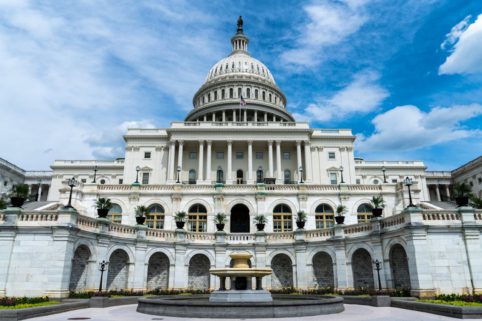Hidden Strings: The Downside of Federal Grants for Nonprofits
 Nathan Mayo
Nathan Mayo
Vice President of Operations & Programs
Read more from Nathan
Listen to this article:
To restore civil society (and in particular, the church) to its rightful place at the forefront of caring for people in need, we believe churches and nonprofits should first turn to their community for funding and volunteers. This ideal alone doesn’t completely rule out federal grants or contracts as a portion of your charity’s budget. However, if faith is at your core, there are governmental strings attached that can significantly limit your program’s effectiveness. Thus, when considering that source of funding, be aware of the following implications:
![]()
1. “Handout” Programs’ Design Bias
In general, federal funds steer ministries towards perpetual crisis-relief programs. One ministry I’ve spoken with fed thousands of children in rural communities with a “handout” oriented government grant. When funding dried up, the ministry was forced to endure a painful lay off of over 200 staff. However, in the end, the ministry rebounded by embedding staff in communities via bi-vocational roles – and actually achieved better results.
In hindsight, it would have been wiser to implement that model in the first place. It would have helped them resist the temptation to keep less effective programming for the sake of easy government money. Indeed, once people depend on a source of funding for their livelihood, it becomes difficult to decline under any circumstances.
2. Restrictions on Faith Integration
Recipients of federal funding are prohibited from using it for “religious instruction.” That means classes funded by the grant must not reference the Bible as the source of authority for any content.
Yet we believe ministries see the best results by integrating faith into all their content — including finances, parenting, and health education. We recommend a turnkey curriculum that integrates a Biblical worldview because it’s essential to flourishing. You can’t effectively disciple people by treating biblical truth as an afterthought with little or no connection to health, parenting, childhood development, and finances.
3. Capricious Rule Changes
Uncle Sam is a particularly fickle partner for Christian ministries because easy rule changes allow low-strings funding to become high-strings funding overnight. I recently spoke with a church plant that staffed their church outreach ministry with federal funds designated for community service. It started with no strings attached. One day, they were informed a new rule did not permit staff hired with that funding to perform any religious duties. Obviously, that defeats the purpose.
4. Increased Liability for Dismissal of Participants
Most developmental programs benefit from screening participants because success depends on people invested in their own growth. While a typical grant doesn’t specifically prevent discrimination on the basis of readiness, a valid determination someone is unprepared can easily result in a frivolous lawsuit alleging the dismissal violated the rights of a protected class. On balance, the Supreme Court has ruled homeless shelters and the like are not public accommodations and therefore not bound by non-discrimination laws. This provides significant protection against such suits.
However, federal grants require you to agree to a labyrinthine list of nondiscrimination categories. Even if you’re not violating any rules, you’re more vulnerable to the charge you are. Also, faith-based residential programs often determine program eligibility on the basis of biological sex rather than gender identity. According to a new HHS granting rule, that is now explicitly forbidden.
Furthermore, language in a typical grant contract specifies that if a grant is used for any property construction or improvement the entire property is subject to non-discrimination requirements and liability. That means a non-government-funded program in a newly-constructed or improved building is just as liable and restricted.
5. Perverse Incentives
Restrictions on who can be served often create perverse incentives for case managers to worsen or exaggerate client needs in order to qualify for aid. For instance, it’s not uncommon for organizations that “help” the homeless to encourage them to live on the street for a while (rather than with friends) to access more government funds.
6. Draw Toward Over-Reliance
Over-reliance on any single funding source — public or private — is a bad idea. So even if your ministry intends to use limited federal funding, remember building the expensive infrastructure to win one government grant will tempt you to compete for more – and ignore the need for multiple-source funding.
There’s solid evidence to support that. A study of 8,000 charities showed a reduction in fundraising efforts following government grants “crowded out” about 75% of the value of the grants. In other words, a grant for $100K resulted in a loss of $75K in private giving due to reduced fundraising efforts. On the contrary, it’s worth noting private foundations and major donors tend to wisely discourage over-reliance on their funding.
7. A Strategic Need to Build an Independent Civil Society
A couple of years ago, I was in a session led by the leader of a 95% government-funded nonprofit. The topic was how to secure federal grants. Though not a person of faith, as an aside he remarked that in his youth in the ’60s, most of the issues his nonprofit currently works on were addressed by families and churches. It is ironic he overlooked the causal link between the accretion of government-funded programs and the retreat of civil society from its weighty and effective lead role in addressing the needs of the poor.
It’s Pollyannaish to believe if a few nonprofits stopped taking federal money, government programs would go away. But it’s my observation that unless we create viable alternatives, political leaders who want local communities to once again take the helm will have no salient evidence to show it can be done. I know that, in part, because we work with some of those leaders. They are inspired by the possibilities represented by privately-funded charities in our growing network.
Looking toward the future, just as high inflation is the predictable result of excessive government expenditure, out-of-control deficits will slow spending on federal programs for the poor (though that may take a couple of decades). When that occurs, civil society’s readiness to address those needs will determine whether we face an humanitarian crisis or a welcome return to more compassionate solutions.
The time to prepare is now. While it may be possible to mitigate some of these harms by keeping government funding under a certain threshold, a far better approach — one that will help us embrace the philanthropic and spiritual opportunity looming on the horizon — is to make “community-first funding” the foundation of our organizations’ DNA.
For more help letting your community know how they can effectively fund your ministry or non-profit, check out our Fundraising Toolkit.




